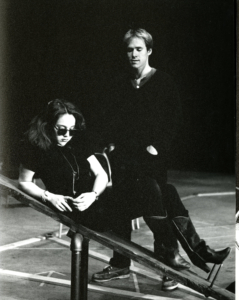DCPA NEWS CENTER
Enjoy the best stories and perspectives from the theatre world today.
Enjoy the best stories and perspectives from the theatre world today.

Passing Game by Steve Tesich
Since our inception in 1979, the DCPA Theatre Company has been committed to new works. In fact, our very first season included
the world premiere of Passing Game by Steve Tesich. By our 1982/83 season we had held our first public reading of a work in development — A Beautiful World by David Jones. Our first theatre festival of 10 unpublished scripts came in 1984/85, our first commission in 2007/08 to Octavio Solis for Lydia, and our Colorado New Play Summit in 2006/07, which continues today.
But you might be wondering what terms like “world premiere,” “reading,” “commission” and “Summit” mean and, more importantly, why you should care.
While there are many established and emerging approaches to the way in which a new play is developed, the DCPA Theatre Company’s main approach is review, read, refine, re-read and produce.
REVIEW & COMMISSION
Each season, the DCPA Theatre Company receives hundreds of unproduced original, full-length plays and musicals. They are reviewed by our literary and artistic team and special consideration is given to plays written by and for women, diverse voices and Colorado-based playwrights and stories. Our team also travels to see other works in development that may benefit from further development.
Occasionally, we identify a promising new playwright, an established playwright whose work we deeply admire or topic that we would like to support, so we invest in the development of a script — and the playwright’s livelihood — through a paid commission.
REHEARSE & READ
Several scripts are selected to be part of our annual Colorado New Play Summit, a theatre festival featuring these works-in-progress. Playwrights are paired with directors, dramaturgs and professional actors to rehearse a play for one week. Then, the cast “reads” directly from the script in front of an audience. The rehearsal time allows the actors to know the right pacing, delivery and dialogue, but they don’t benefit from lights, costumes, sets or sound. Just the actors and the words and the audience.
REFINE
A unique aspect of our Summit is that, instead of packing up and going home after the reading, the real work begins. Armed with the audience response, the playwright, director and dramaturg make everything from tiny tweaks to massive overhauls to the script. Whole scenes may be scrapped, new dialogue added, a scene turned entirely on its head. All the while the actors are part of the creative process as the playwright experiments with new text, new stage directions and new ideas.
RE-READ
Now is the time to see how much a script has evolved. The playwrights receive a second public reading, but this time the stakes are a little higher. We invite representatives from our peer theatres across the country to attend who give constructive, valuable feedback and to generate interest in the work and the writer.
PRODUCE

The Nest by Theresa Rebeck
The goal, of course, is for the play to receive a full production. As the Summit presenter, the DCPA Theatre Company often receives the first right of refusal to option a script for a full production. If, however, we pass on a play, another theatre may pick it up. Or, if the script requires further development, the playwright may be invited to participate in another reading, workshop or theatre festival. Often, the audiences that attend the Summit reading come back to see the finished piece debut on stage knowing that they helped inform the end result.
But then what? After a play receives its world premiere, a playwright hopes it has “legs” and catches the interest of other theatres. Many plays have gotten their start in Denver and gone on to be produced around the country. Some, even, have been optioned for movies, HBO specials and been produced by other theatres or Broadway.
Of the DCPA Theatre Company’s 400+ productions, nearly 150 have been new works. From Quilters, which debuted in 1982/83 and went on to be among the most widely produced plays the following season, to Black Elk Speaks, which toured to Hong Kong, to The Laramie Project, which was made into an HBO Special, and to The Whale, which is being made into a movie — many great stories have started here in Denver and gone on to be part of America’s theatrical canon.
INFORMATION:
